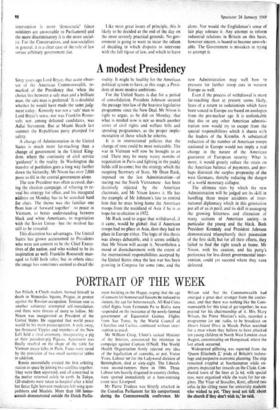A modest Presidency
Sixty years ago Lord Bryce, that acute obser- ver of the American Commonwealth, re- marked of the Presidency that 'when the choice lies between a safe man and a brilliant man, the safe man is preferred.' It is doubtful whether he would have made the same judg- ment today : Kennedy was not a 'safe' man in Lord Bryce's sense, nor was Franklin Roose- velt; nor, among defeated candidates, was Adlai Stevenson. But at Miami Beach last summer the Republican party plumped for safety.
A change of Administration in the United States is much more far-reaching than a change of government in the United King- dom, where the continuity of civil service 'guidance' is the reality. In Washington the transfer of portfolios goes a long way further down the hierarchy. Mr Nixon has over 2,000 posts to fill in the central government alone.
The new President was often accused, dur- ing the election campaign, of refusing to re- veal his strategy for office, and his inaugural address on Monday has to be searched hard for clues. The theme was the familiar one from him of 'forward together'--to peace in Vietnam, to better understanding between black and white Americans, to negotiation with the Soviet Union—but the method has still to be revealed.
This discretion has advantages. The United States has grown accustomed to Presidents who were not content to be the Chief Execu- tives of the nation, and who wished to be its inspiration as well. Franklin Roosevelt man- aged to fulfil both roles; but in others since the image hits sometimes seemed to dwarf the reality. It might be healthy for the American political system to have, at this stage, a Presi- dent of more modest ambitions.
For the United States is due for a period of consolidation. President Johnson secured the passage into law of the heaviest legislative programme since the New Deal. Mr Nixon is right to argue, as he did on Monday, that what is needed now is not so much another series of civil rights and welfare bills and spending programmes, as the proper imple- mentation of those which he inherits.
It is in international policies that the change of tone could be most noticeable. The war in Vietnam will now be brought to an end. There may be many weary months of negotiation in Paris and fighting in the paddy fields still to come; but the strategy which the outgoing Secretary of State, Mr Dean Rusk, imposed on the last Administration—of staring out the North Vietnamese—has been decisively rejected by the American electorate, and Mr Nixon knows it. He has the example of Mr Johnson's fate to remind him that he must bring home the American troops from the mainland of Asia if he is lo hope for re-election in 1972.
Mr Rusk used to argue that withdrawal, if it came, would be global: that if American troops had no place in Asia, then they had no place in Europe either. The logic of this thesis was always debatable, and it seems unlikely that Mr Nixon will accept it. Nevertheless a mood of disenchantment with the extent of the international responsibilities accepted by the United States since the last war has been growing in Congress for some time, and the new Administration may well bow to pressure for further troop cuts in western Europe as well.
Even if the process of withdrawal is more far-reaching than at present seems likely, fears of a return to isolationism which have been voiced in Europe are based on analogies from the pre-nuclear age. It is unthinkable that this or any • other American adminis- tration now would try to escape from the special responsibilities which it shares with the leaders of the Kremlin. A substantial reduction of the number of American troops stationed in Europe would not imply areal change in the nature of the American guarantee of European security. What is more, it would greatly reduce the strain on the American balance of payments, and per- haps diminish the surplus propensity of the west Germans, thereby reducing the danger of a world monetary collapse.
The ultimate tests by which the new Administration will be judged are its skill in handling those major accidents of inter- national diplomacy which in this generation put all of us in peril, and its skill in assuaging the growing bitterness and alienation of many sections of American society—in particular the young and the black. Both President Kennedy and President Johnson demonstrated triumphantly their possession of the first skill; but for all their efforts, they failed to find the right touch at home. Mr Nixon, with his caution, and his party's preference for less direct governmental inter- vention, could yet succeed where they were defeated.


































 Previous page
Previous page